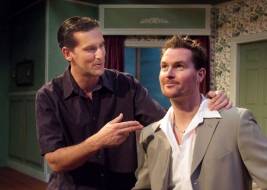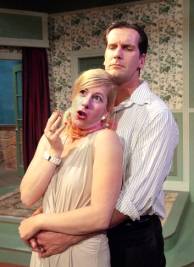
The Long Weekend is one heck of a dull title for a play as hilarious and cleverly written as the one now getting its West Coast Premiere at Theatre 40. Then again, if you’re Canada’s most produced playwright whose 38 scripts receive an average of 150 productions a year, it probably doesn’t matter Up North what you call each new one, your fellow Canadians will turn out in droves for it. Still, for us Americans who may not know the difference between Norm Foster, Jodie Foster, Cheers’ Norm Peterson, or Foster Farms, the title The Long Weekend suggests a dreary dramatic piece, when in fact Foster’s 1994 two-acter is a tantalizing comedic gem of a play, terrifically performed at Theatre 40 by its cast of four and directed with verve by the prolific Bruce Gray.
I’d like to offer The Grass Is Greener as its American moniker, for that’s exactly how married couples Max and Wynn and Roger and Abby appear to feel about each other’s spouses before discovering the truth behind this age-old axiom.
But first, the setup.
Personal injury lawyer Max (John Mullen) and relationship counselor Wynn (Kathryn Larsen) have invited Wynn’s longtime best friend and clothing store owner Abby (Lizzie Peet) and schoolteacher-turned-aspiring screenwriter Roger (Shawn Savage) for A Weekend In The County—hey, that might be a good title too—despite the fact that the two women’s friendship has a good deal of the passive-aggressive in it and that Max and Roger can’t stand each other’s guts.
We discover this in a pair of opening scenes that allow us to meet each couple individually before they get thrown together and the fireworks begin.
Max is certain that Roger will criticize his “opulent lifestyle” and go on about “how it must be nice to be able to throw money away on a second home. And then he’ll start to brag about that bloody screenplay of his.” Wynn worries that Abby will be “looking this place up and down trying to find a decorating faux pas” (like the bright yellow kitchen walls) but determines not to let it bother her. After all, “Abby and I have been friends for too long to let a little thing like that come between us.”
The following scene introduces Roger, grumbling about the “half a mile” they’ve had to walk from their car to Max and Wynn’s front door (“We should’ve hired a Sherpa”) and about Max’s tendency to “to flaunt his money in my face. Capitalist swine.” There’s also the matter of the twenty-three dollar drink tab Max stuck Roger with years ago when the two couples were imbibing piña coladas with a German couple in Martinique. “The man never paid me back,” gripes Roger. “Not a cent, the son of a bitch.” As for Abby’s gripes, there’s Wynn’s habit of doing “things that just get under my skin. Like the cooking thing. Oh, and the way she always analyzes me.”
Can you spell Recipe For Disaster?
 Naturally, neither couple lets on how they feel about the other once in the same room, though we know that when Roger brings up Martinique and Max claims not to remember a thing about it, we’ve already heard how much that un-repaid drink tab still rankles Roger.
Naturally, neither couple lets on how they feel about the other once in the same room, though we know that when Roger brings up Martinique and Max claims not to remember a thing about it, we’ve already heard how much that un-repaid drink tab still rankles Roger.
Abby’s realization that her hubby has left their camera in their car and Wynn’s decision to join Roger on the trek to keep him company leaves Max and Abby alone, and before you can say “adulterous affair,” the stuffy lawyer and his wife’s kooky best friend are in each other’s arms, and exchanging passionate declarations: “God I want you so badly.” “I want you more badly.” “No, you don’t.” “Yes, I do.” “No, you can’t want me badlier than I want you.” “Then I want you as much.” “Then take me. Right here. Right now.”
And the fun and frolicking have only just gotten started.
Whereas Neil Simon is known as a master of the one-liner, Foster’s jokes come out of the situations he’s put his characters in, with a seemingly chance remark getting its payoff some time later in the play. Take for instance one of Max and Wynn’s chairs, which Abby has described as “hideous” when she and Roger were alone. Later on, when Wynn asks what her best friend thinks of it, Abby’s “Oh, sweet merciful Moses. Where on God’s green earth would you get a chair like that, Wynn?” is all the funnier because we know how much Abby dislikes it. When Wynn takes Abby’s “That chair belongs in this room” as a compliment, we laugh because we know it is intended as anything but praise.
Foster is also terrific at mining laugh after laugh from running gags like said chair, Wynn’s yellow kitchen, Max’s driveway-less home, his selective amnesia where piña coladas are concerned, and the verb “assuage,” the search for which sent Roger into a three-month-long writer’s block.
The Long Weekend is also a perfect example of why the two-act play will likely surely remain a popular choice even in these ninety-minute one-act days. Foster’s comedy wouldn’t play nearly as well without its Act One blackout, the better to tantalize the audience with what’s in store in the “Two Years Later” second act during intermission.
Though The Long Weekend isn’t set in any particular year, this reviewer couldn’t help noticing how absent 21st Century technology is in this mid-‘90s play. I wonder how Foster would have written The Long Weekend in 2010s with cell phones and the Internet playing a part in the festivities.
Of course for Foster’s play to work as well as it does at Theatre 40, it needs a cast of actors who can get laughs not because they’re reaching for them but because they’ve created believable characters who aren’t trying to be funny per se, and in this respect, producer David Hunt Stafford and director Gray have come up with a winning foursome.
 Larsen gives a finely etched performance as uptight Wynn, and Mullen more than equals her as her starched shirt of a husband (who just happens to look runway-ready). Savage and Peet get the more colorful roles, and both are terrific. One of Theatre 40’s most versatile leading men, Savage has a field day here playing Oscar to Larsen’s and Mullen’s Felixes. Peet is the best of all, a comedienne with her own distinctive flair and the ability to cry real, believable tears even as she’s making us laugh through them.
Larsen gives a finely etched performance as uptight Wynn, and Mullen more than equals her as her starched shirt of a husband (who just happens to look runway-ready). Savage and Peet get the more colorful roles, and both are terrific. One of Theatre 40’s most versatile leading men, Savage has a field day here playing Oscar to Larsen’s and Mullen’s Felixes. Peet is the best of all, a comedienne with her own distinctive flair and the ability to cry real, believable tears even as she’s making us laugh through them.
Scenic designer Jeff G. Rack has created a nicely detailed country home, precisely as Wynn would have decorated it, and the visible yellow wall leading to the kitchen is a nice touch, one that gets a great payoff in Act Two. Michèle Young’s costumes have clearly been chosen with each character’s personality quirks in mind. (Take a look at Max’s carefully matching Act One garb with Roger’s clashing Hawaiian shirt and plaid pants, and you know right away just who is who.) Monocroussos lights Rack’s set and Young’s costumes with expertise and flair. Bill Froggatt’s sound design is a winner too, Kenny G wafting in at just the right moment.
Rhonda Lord is assistant director. Michael Frank is stage manager.
The Long Weekend is Theatre 40’s very first Norm Foster play, and the good news is that it won’t be their last. Foster’s Opening Night is already set for a slot in their 2012-13 season and there will hopefully be many more after that. There are certainly enough of them to keep T40 audiences laughing for years.
Theatre 40, 241 S. Moreno Dr., Beverly Hills.
www.Theatre40.org
–Steven Stanley
June 10, 2012
Photos: Ed Krieger


 Since 2007, Steven Stanley's StageSceneLA.com has spotlighted the best in Southern California theater via reviews, interviews, and its annual StageSceneLA Scenies.
Since 2007, Steven Stanley's StageSceneLA.com has spotlighted the best in Southern California theater via reviews, interviews, and its annual StageSceneLA Scenies.







 COPYRIGHT 2024 STEVEN STANLEY :: DESIGN BY
COPYRIGHT 2024 STEVEN STANLEY :: DESIGN BY